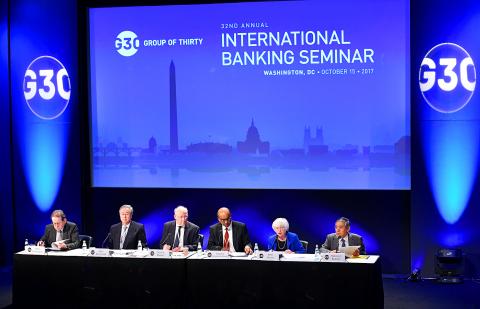US Federal Reserve Chair Janet Yellen said that the US central bank expects to continue to raise interest rates gradually as solid growth, a strong labor market and a healthy global economy lift prices even as she recognized that inflation has been surprisingly low.
“My best guess is that these soft readings will not persist, and with the ongoing strengthening of labor markets, I expect inflation to move higher next year,” Yellen said on Sunday at the Group of 30’s Annual International Banking Seminar in Washington.
Yellen’s term expires in February next year and she is said to be among the candidates US President Donald Trump is considering to be his pick to lead the central bank.

Photo: Bloomberg
She has presided over a sustained recovery from the global financial crisis, though inflation has remained below the Fed’s 2 percent goal, a development that has puzzled policy makers at a time when the unemployment rate has fallen past its pre-crisis low.
“The biggest surprise in the US economy this year has been inflation,” Yellen said on a panel that included Bank of Japan Governor Haruhiko Kuroda, People’s Bank of China Governor Zhou Xiaochuan (周小川) and European Central Bank Vice President Vitor Constancio.
While the Fed chair said she expects a pickup, she and her colleagues “recognize that this year’s low inflation could reflect something more persistent than is reflected in our baseline projections.”
Inflation came in at 1.3 percent in August after stripping out volatile food and fuel, well below the Fed’s target. It has been headed in the wrong direction for months, and data through the end of the year will be unreliable, clouded by seasonal adjustment issues and price fluctuations wrought by hurricanes that hit the US south late this summer.
Employment, meanwhile, has surpassed officials’ expectations. The US jobless rate has fallen to 4.2 percent, its lowest level since 2001, and the participation rate has shown stabilization as Americans come back into the workforce. Wages have been slow to accelerate, but show early signs of life.
“On balance, wage gains appear moderate, and the pace seems broadly consistent with a tightening labor market once we account for the disappointing productivity growth in recent years,” Yellen said in her prepared comments.
“Risks to global growth have receded somewhat,” she said, adding that she and her colleagues “expect growth to continue to improve over the near term.”
If strong growth and labor market tightness do push inflation higher, it would support the committee’s policy of gradual tightening through interest-rate increases and a reversal of quantitative easing.
Officials project another increase this year, and market pricing shows that investors see the move coming in December.
“We continue to expect that the ongoing strength of the economy will warrant gradual increases in that rate to sustain a healthy labor market and stabilize inflation around our 2 percent longer-run objective,” Yellen said.
Central bankers voted last month to begin unwinding their balance sheet, and Yellen reiterated on Sunday that they do not intend to use that process as an active monetary policy tool.
“Our balance sheet will decline gradually and predictably,” she said, avoiding outside movements in interest rates and market strains.
Some Fed officials have cited concerns over financial stability as another reason to gradually raise rates after US stock markets reached record highs.

The Eurovision Song Contest has seen a surge in punter interest at the bookmakers, becoming a major betting event, experts said ahead of last night’s giant glamfest in Basel. “Eurovision has quietly become one of the biggest betting events of the year,” said Tomi Huttunen, senior manager of the Online Computer Finland (OCS) betting and casino platform. Betting sites have long been used to gauge which way voters might be leaning ahead of the world’s biggest televised live music event. However, bookmakers highlight a huge increase in engagement in recent years — and this year in particular. “We’ve already passed 2023’s total activity and

Nvidia Corp CEO Jensen Huang (黃仁勳) today announced that his company has selected "Beitou Shilin" in Taipei for its new Taiwan office, called Nvidia Constellation, putting an end to months of speculation. Industry sources have said that the tech giant has been eyeing the Beitou Shilin Science Park as the site of its new overseas headquarters, and speculated that the new headquarters would be built on two plots of land designated as "T17" and "T18," which span 3.89 hectares in the park. "I think it's time for us to reveal one of the largest products we've ever built," Huang said near the

China yesterday announced anti-dumping duties as high as 74.9 percent on imports of polyoxymethylene (POM) copolymers, a type of engineering plastic, from Taiwan, the US, the EU and Japan. The Chinese Ministry of Commerce’s findings conclude a probe launched in May last year, shortly after the US sharply increased tariffs on Chinese electric vehicles, computer chips and other imports. POM copolymers can partially replace metals such as copper and zinc, and have various applications, including in auto parts, electronics and medical equipment, the Chinese ministry has said. In January, it said initial investigations had determined that dumping was taking place, and implemented preliminary

Intel Corp yesterday reinforced its determination to strengthen its partnerships with Taiwan’s ecosystem partners including original-electronic-manufacturing (OEM) companies such as Hon Hai Precision Industry Co (鴻海精密) and chipmaker United Microelectronics Corp (UMC, 聯電). “Tonight marks a new beginning. We renew our new partnership with Taiwan ecosystem,” Intel new chief executive officer Tan Lip-bu (陳立武) said at a dinner with representatives from the company’s local partners, celebrating the 40th anniversary of the US chip giant’s presence in Taiwan. Tan took the reins at Intel six weeks ago aiming to reform the chipmaker and revive its past glory. This is the first time Tan